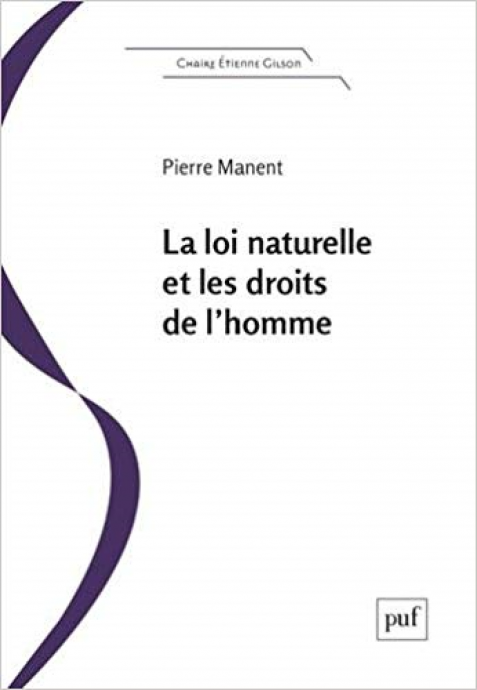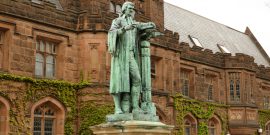Peter Lawler laid out how the middle class was the class that best represented our middling status as human beings, neither gods nor beasts.
Pierre Manent on Machiavelli, Luther, and the Eclipse of the Natural Law
For most participants in modern political discourse, human rights are real and natural law is not.
More than that, the limits of natural law—not just particular natural law arguments made about human nature and its institutions—are seen as oppressive and mere constructs. Human rights, by contrast, are real freedoms that must be respected and benefits that must be granted to all human beings.
The French political philosopher Pierre Manent’s most recent book, Natural Law and the Rights of Man, is developed from his 2017 lectures for the Etienne Gilson Chair at the Institut Catholique in Paris and will be published in English later this year. (The final lecture is already available in translation.) In it, Manent offers a diagnosis of the way in which human rights have come to eclipse the natural law. He also advances an argument about the nature of political action and command in light of that law’s rationality and outlines the consequences of obscuring action. This shift from natural law to human rights was supposed to free us, Manent concludes, but has left us paralyzed.
The Double Standard that Relativism Creates
The perfect example arose last month. On February 19, the Trump administration announced a new campaign to fight laws in 72 countries that criminalize same-sex sexual acts. Why did Out magazine condemn it as racist and colonialist, instead of supporting it as a way to keep gays from being killed and imprisoned? Because rights claims are the moral trump card in our public debates, but not when it comes to cultures other than our own. As Manent notes, in our own countries, the bien pensant constantly make judgments about right and wrong in order to reform society. It is inexcusable to maintain the status quo, they claim, since nothing is more urgent or just than for men and women like us to recognize, declare, and vindicate our fundamental rights. But regarding other countries, they are more likely to suspend judgment: We would not want to suggest that our way of life is superior to those of other cultures, especially in a post-colonial era. As a result, we regard the “other” with cultured non-judgment, while furiously judging ourselves.
In effect, Manent argues, we posit that human rights are a rigorously universal principle, which have value for all cultures without exception. At the same time, we posit that all cultures and forms of life are equal, and that all appraisal that would presume to judge them is discriminatory. On the one hand, all human beings are equal, and we must fight vigorously for the equality of men and women in our society; on the other hand all cultures have the right to an equal respect, even those that violate the equality of human beings, and we should refrain from condemning cultures that, for example, keep women in a subordinate state.
This contradiction captures the paralysis Manent sees in our contemporary framework of rights. If we want to condemn barbarism without using scare quotes, he writes, there must be a human nature with which our actions can accord or that we are capable of violating. That nature operates according to a logic that we did not create ourselves. As he put it in a recent interview with the conservative French weekly Valeurs Actuelles, the natural law is the group of rules that necessarily order human life, and that human beings have not made. These laws fix the limits of our liberty, but also give it its orientation.
The Pleasant, the Useful, and the Honest
As Manent sees it, the natural law is not an ideal but a set of practical principles for action that helps agents act toward a happy life. All true action is a collaboration and balancing between the three principal motives of human action: the pleasant, the useful, and the honest. Without objective, transcendent principles, there is nothing to guide human freedom—nothing to determine what is pleasant, useful, or honest. “Natural law,” he concludes, “is the only serious defense against nihilism.”
Our problem today is that such thinking no longer makes sense to us. Manent traces this incomprehension to the reduction of our understanding of human nature to the separated individual and examines how it manifests itself in Niccolo Machiavelli and Martin Luther. Like other early moderns, Machiavelli claimed that he would not analyze humanity from inductive, Aristotelian principles, but would consider it “as it actually is.” Manent argues that Machiavelli fails to do this, because he substitutes a theoretical action for action “as it actually is.”
Instead of practical action, Machiavelli examines action as it can be seen by the theoreticians, without the point of view of the agent. For Machiavelli, human beings are prisoners of a fear of death and a fear of natural or divine law—a law that protects, but locks us in fear. To overcome this, he calls for a new kind of human agent who no longer fears the law and can therefore act according to what the situation authorizes and demands. We must escape our conscience (and the practical judgments it makes) and turn to the science of history for theoretical guidance for our action.
Manent sees a similar repudiation of practical reasoning and action in Luther: The acting Christian is replaced by the believer. For Luther, the Law produces a guilt and despair that can only be cured by faith, not action. The certitude of faith, not actions or conduct or conscience, determine salvation. As we saw with Machiavelli, the man who acts according to his conscience formed by the principles of the law is unable to accomplish his necessary end. Lutheran faith and Machiavellian virtu are different, but they both claim to allow us to escape the shame of the practical life and make the necessary break between ourselves and the law.
The Loss of the Law
In their own ways, therefore, Machiavelli and Luther illustrate the modern loss of the law as “rule and measure of action.” In a 2014 essay—which will serve as an appendix to the forthcoming translation of La loi naturelle et les droites de l’homme—Manent diagnoses our illness as a loss of the intelligence of law. This loss was not accidental, he writes:
We have lost it because we wanted to lose it. More precisely, we have fled from law. We are still fleeing from it. We have been fleeing from law since we took up the project—let us call it “the modern project”—to organize common life, the human world, on a basis other than law. . . . Rights and self-interest are the two principles that allow for the ordering of the human world without recourse to law as the rule and measure of action. Of course we still have laws, indeed more laws than ever, but their raison d’être is no longer directly to regulate our actions but rather to guarantee our rights and equip us to seek our interests in a way that is useful or at least not harmful to the common interest.
Our flight from the law in the name of more freedom to act has paradoxically undermined the principles for practical action. It turns out that we could not make our own meaning and give ourselves our own laws and ends.
This is the heart of the problem that Manent identifies with the modern state. In ancient political thought, only the body politic as a whole could be autonomous or give itself the law. In the modern conception of the state—especially for French conceptions of the state rooted in Jean-Jacques Rousseau’s thought—the citizen authorizes the state’s commands that he must obey. How then can he be said truly to obey? Manent argues that the idea of obeying my own commands or commanding myself simply does not work. It requires that I imagine myself as two, a commanding self and an obeying self that is distinct but also me; I cannot imagine myself to be autonomous without producing a heteronomy in myself. In this way, our society confuses command and obedience and obscures them. This in turn damages our ability to perform true political actions, given that command is “the core and essence of action.”
The greatest contrast Manent identifies between the ancient and the modern world is the difference between the free agent and the free individual. The free agent is concerned more about the intrinsic quality of his action than the objects exterior to his action, while the free individual is more concerned with exterior obstacles to his action than its intrinsic quality. For example, free agents and free individuals view death differently. For the individual, death is an obstacle to be removed. For the agent, death becomes part of the logic of action. Death is not the chief obstacle to be overcome or conquered, and therefore the great menace, but one of the many rules and motifs governing action. The individualistic view of death as an extrinsic act of life is most fully captured in euthanasia, the arbitrary but authorized killing of innocents.
How Modernity Crowded Out the Possibility of Action
In the Greek city, a well-constituted democracy, each citizen commands and obeys alternately. No one would dream of pretending that he obeys himself or commands himself. At the beginning of the modern epoch, we deliberately abandoned the law that commands and gives a rule of action. In its place, the modern state organizes the condition of action—an action now judged not according to its rule or end, but according to its effects. By abandoning ourselves to the inertia of laissez-faire, laissez-passer, however, we have lost sight of the central role of command in practical life, especially the commanding role of the law as rule of common action. Instead, we place our faith in the idea that a certain inaction, or a certain abstention from action, is the origin of the greatest goods.
We have a greater flux of goods and services, but we abstain from actions that would be likely to moderate and direct the movement of men and things. Between two modes of passivity— suffering and enjoying—that hold all our attention and provide the matter of all our new rights, we have no more place for acting.
For all of this bracing diagnosis, Manent offers little in the way of prescription. How does his analysis cash out in terms of practical political action? Perhaps it helps to uncover the roots of the powerlessness that many feel in the face of larger political forces, and to explain how the possibility of real political action came to be so circumscribed.
If so, what is the alternative? What could help us recover our sense of the intelligence of law? Neither the absolutism of radical Islam in France’s present, nor the absolutism of throne and altar in her past, receive the philosopher’s endorsement; he gestures, rather, toward ancient Greece. There he finds representative self-government in accord with the natural law and without the conceits of the modern state. At the end of his Valeurs Actuelles interview, he also gestured toward France’s rich literary and spiritual traditions and history of rational discussion. These should, said Manent, “allow us to find an alternative to virulent and blind rights claims and the irony, shoulder-shrugging, or sterile sarcasm of the politically incorrect.”



